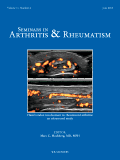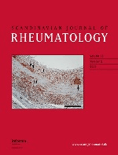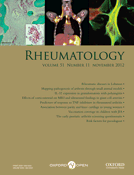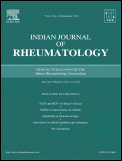
Reumatologia Clinica
Scope & Guideline
Unveiling the complexities of rheumatic diseases.
Introduction
Aims and Scopes
- Clinical Research in Autoimmune Diseases:
The journal emphasizes research on various autoimmune rheumatic diseases, including systemic lupus erythematosus, rheumatoid arthritis, and psoriatic arthritis, with a focus on understanding their clinical manifestations, treatment responses, and long-term outcomes. - Innovative Therapeutic Strategies:
Reumatologia Clinica publishes studies exploring new therapeutic approaches, including the use of biologics, JAK inhibitors, and other emerging treatments for rheumatic conditions, promoting evidence-based practice in clinical settings. - Multidisciplinary Approaches:
The journal encourages interdisciplinary research that integrates perspectives from rheumatology, immunology, and other medical fields, fostering a comprehensive understanding of rheumatic diseases. - Patient-Centered Outcomes:
Research focusing on patient-reported outcomes, quality of life, and psychosocial aspects of living with rheumatic diseases is a key area, highlighting the importance of patient experiences in treatment evaluations. - Epidemiological and Public Health Studies:
The journal includes epidemiological studies that assess the prevalence, risk factors, and societal impacts of rheumatic diseases, contributing to public health awareness and healthcare policy.
Trending and Emerging
- Impact of COVID-19 on Rheumatic Patients:
There is a growing focus on research examining the effects of the COVID-19 pandemic on patients with rheumatic diseases, including the impact on treatment adherence, disease activity, and psychosocial health. - Use of Telemedicine in Rheumatology:
The rise of telemedicine during the pandemic has led to an increased interest in studies evaluating its effectiveness in managing rheumatic conditions, highlighting the need for adaptability in patient care. - Longitudinal Studies on Disease Progression:
Emerging themes include longitudinal studies that track disease progression and treatment outcomes over time, providing valuable insights into the long-term management of rheumatic diseases. - Biomarkers and Personalized Medicine:
Research on biomarkers for disease diagnosis, prognosis, and treatment response is trending, reflecting a shift towards personalized medicine approaches in rheumatology. - Mental Health and Chronic Illness:
There is an increasing emphasis on the intersection of mental health and chronic rheumatic diseases, with studies exploring the psychological impact of living with these conditions and the importance of integrated care.
Declining or Waning
- Traditional Pharmacological Treatments:
There is a noticeable decrease in studies focusing solely on traditional pharmacological treatments for rheumatic diseases, as the field increasingly prioritizes innovative therapies and personalized medicine approaches. - Basic Mechanistic Studies:
Research focusing on the basic biological mechanisms of rheumatic diseases has become less frequent, likely due to a shift towards more clinically applicable studies that directly impact patient care. - Single-Country Studies:
While regional studies have been important, there is a declining trend in single-country research, as the journal now favors multi-center or international studies that provide broader insights applicable to diverse populations. - Non-Clinical Observational Studies:
The journal has seen a reduction in non-clinical observational studies that do not directly inform clinical practice, as the focus shifts more towards studies with immediate relevance to treatment and patient management. - Rare Disease Case Reports:
There has been a decline in the publication of case reports related to rare diseases, as the journal prioritizes larger cohort studies that offer more significant statistical power and generalizability.
Similar Journals

SEMINARS IN ARTHRITIS AND RHEUMATISM
Elevating research standards in arthritis and rheumatism.SEMINARS IN ARTHRITIS AND RHEUMATISM, published by W B Saunders Co-Elsevier Inc, is a leading journal in the fields of rheumatology and pain medicine. With an impressive impact factor and recognized as a Q1 journal in both its categories, it ranks #8 in Anesthesiology and Pain Medicine and #11 in Rheumatology based on the latest Scopus data, placing it within the top echelons of academic research. Established in 1971, this esteemed publication offers a comprehensive platform for researchers and practitioners to disseminate and engage with cutting-edge studies that advance the understanding and treatment of arthritis and related conditions. With its robust editorial process and focus on high-quality, peer-reviewed articles, the journal not only contributes to scientific knowledge but also serves as an essential resource for professionals and students seeking contemporary insights into effective management strategies and emerging therapies in the rheumatologic field. Although it does not offer open access, its subscription model ensures a wide distribution among academic and clinical institutions, reinforcing its significance in the research community.

RHEUMATOLOGY INTERNATIONAL
Connecting global experts in rheumatology and immunology.Rheumatology International, published by Springer Heidelberg, is a prestigious journal that focuses on innovative research in the field of rheumatology and immunology. Established in 1981, this peer-reviewed journal has contributed significantly to advancing our understanding of autoimmune disorders, clinical approaches, and therapeutic interventions. It holds a commendable Q2 ranking in the categories of Immunology, Immunology and Allergy, and Rheumatology as of 2023, showcasing its influence and importance within these disciplines. With a robust Scopus ranking—positioned 14 out of 73 in Medicine Rheumatology—it caters to a diverse audience of researchers, clinicians, and students committed to improving patient care and treatment modalities. Although it does not currently offer open access options, the journal remains a vital resource for insights on contemporary challenges and breakthroughs in rheumatological research, published from its base in Heidelberg, Germany.

SCANDINAVIAN JOURNAL OF RHEUMATOLOGY
Connecting Scholars to Transform Rheumatological CareThe Scandinavian Journal of Rheumatology, published by Taylor & Francis Ltd, is a prestigious peer-reviewed journal dedicated to advancing research in the fields of rheumatology, immunology, and related disciplines. With an ISSN of 0300-9742 and an E-ISSN of 1502-7732, this journal has established itself as a vital platform for disseminating significant findings and innovative approaches in the management of rheumatic diseases since its inception in 1959. As a recognized scholarly outlet, it currently resides within the Q2 category for Medicine (miscellaneous) and ranks #39 out of 73 in Rheumatology according to the 2023 Scopus assessments. This reflects the journal's commitment to high-quality research and its relevance in the scientific community. Although it does not provide Open Access options, the journal's rigorous selection process ensures that only the most impactful research reaches its audience, making it a crucial resource for researchers, clinicians, and students engaged in the exploration of rheumatological and immunological challenges. The journal's broad scope encompasses ongoing studies, clinical trials, and reviews that aim to enhance understanding and treatment of rheumatic conditions, promoting collaboration and knowledge-sharing among professionals in the field.

Pediatric Rheumatology
Championing excellence in pediatric rheumatology research and practice.Pediatric Rheumatology is a leading peer-reviewed open access journal published by BMC, dedicated to disseminating high-quality research in the field of pediatric rheumatology. Since its inception in 2007, the journal has established itself as a vital resource for healthcare professionals, researchers, and students focused on pediatric immunology, rheumatology, and child health, maintaining an impressive Q1 ranking in Pediatrics and Q2 in Immunology and Allergy as well as Rheumatology for 2023. It is recognized for its impact on advancing knowledge and clinical practice, with significant contributions noted in various studies and case reports. With access options that embrace the ethos of open science, all articles published in Pediatric Rheumatology are freely available, promoting collaborative research and discussion among practitioners across the globe. The journal welcomes submissions that encapsulate innovative research, clinical trials, and reviews that address both current challenges and advancements within the pediatric rheumatology landscape.

RHEUMATOLOGY
Empowering Clinicians with Cutting-Edge Rheumatology FindingsRHEUMATOLOGY, published by Oxford University Press, is a leading journal in the fields of Pharmacology and Rheumatology, recognized for its significant contribution to advancing the understanding and treatment of rheumatic diseases. With an impressive impact factor and ranking within the top quartiles for both medical pharmacology and rheumatology, this journal serves as an essential resource for researchers, clinicians, and healthcare professionals. The journal spans an extensive publication history, with contributions from 1952 to 1995 and from 1998 to 2024, reflecting its enduring commitment to disseminating high-quality research. The Open Access option allows for broader dissemination of knowledge, enhancing the visibility of groundbreaking studies. Positioned in the United Kingdom, RHEUMATOLOGY not only offers valuable insights into the latest therapeutic advancements and clinical guidelines but also fosters collaboration across disciplines, ensuring that practitioners stay at the forefront of innovation in the management of rheumatic conditions.

CLINICAL AND EXPERIMENTAL RHEUMATOLOGY
Navigating the frontiers of immunological discovery.CLINICAL AND EXPERIMENTAL RHEUMATOLOGY is a prestigious journal published by CLINICAL & EXPER RHEUMATOLOGY, dedicated to advancing the field of rheumatology and immunology. With a rich history dating back to 1983, the journal serves as a critical platform for researchers, clinicians, and professionals seeking to disseminate and discuss innovative findings in these rapidly evolving areas. Featuring an impressive Q2 ranking in both Immunology and Allergy, as well as Rheumatology, this journal is recognized for its high-quality contributions, placing it among the top tier of academic publications. Operating without an open access model, CLINICAL AND EXPERIMENTAL RHEUMATOLOGY is headquartered in Pisa, Italy, and publishes articles that undergo rigorous peer review to ensure excellence in research. This journal is an invaluable resource for those dedicated to improving patient outcomes through evidence-based practice in rheumatology, immunology, and related fields.

Advances in Rheumatology
Unlocking the potential of rheumatology through open access.Advances in Rheumatology is a premier open-access journal published by BMC, dedicated to advancing the field of rheumatology through high-quality, peer-reviewed research. Launched in 2018, the journal has quickly established itself within the academic community, achieving a commendable Q2 ranking in the category of Rheumatology as of 2023 and ranking #34 out of 73 in the Scopus Medicine Rheumatology listings, placing it in the 54th percentile. With a focus on innovative treatments, patient care, and the latest in rheumatological research, the journal provides a platform for researchers and clinicians to disseminate their findings and foster collaborative advancements in this critical area of medicine. Recognized for its accessibility, the journal follows an open-access model, ensuring that research is freely available to a global audience. With a commitment to high standards of academic rigor, Advances in Rheumatology plays a vital role in enhancing the understanding and treatment of rheumatic diseases, making it an invaluable resource for researchers, professionals, and students alike.

Modern Rheumatology
Exploring Breakthroughs in Rheumatic Disease ResearchModern Rheumatology is a premier journal dedicated to advancing the field of rheumatology through high-quality peer-reviewed research. Published by Oxford University Press, this journal reflects the latest developments in rheumatologic medicine, catering to researchers, clinicians, and students alike. With an H-Index highlighting its scholarly impact, Modern Rheumatology occupies a notable position, ranking Q2 in both the fields of Medicine and Rheumatology in 2023, and is listed among the top 25 journals in its category by Scopus. Spanning from the year 2000 to 2024, the journal features a diverse array of topics aimed at addressing current challenges and innovations in the field. Although it does not offer Open Access, it provides essential insights for professionals seeking to stay abreast of evolving treatment modalities and research breakthroughs. Located in the heart of the United Kingdom, Modern Rheumatology is a vital resource for anyone committed to enhancing the understanding and treatment of rheumatic diseases.

Current Treatment Options in Rheumatology
Transforming patient care with the latest in rheumatic therapies.Current Treatment Options in Rheumatology, published by SPRINGERNATURE, is a pivotal journal focused on advancing the field of rheumatology through the dissemination of cutting-edge research and comprehensive reviews. With an emphasis on current therapeutic strategies, this journal aims to provide healthcare professionals, researchers, and students with up-to-date information on the latest treatment modalities for rheumatic diseases. Although it operates under a subscription model, it offers a platform for sharing significant findings that can influence clinical practice and policy within the field of rheumatology. By promoting insightful discussions and collaborations, Current Treatment Options in Rheumatology plays a crucial role in shaping the future of rheumatic disease management and improving patient outcomes.

Indian Journal of Rheumatology
Connecting researchers and practitioners in the realm of rheumatology.Welcome to the Indian Journal of Rheumatology, a premier scholarly platform dedicated to advancing research and clinical practice in the field of rheumatology. Published by SAGE Publications Inc., this journal has been providing open access to its valuable content since 2006, promoting the dissemination of knowledge in India and beyond. As a voice in the rheumatology community, the journal addresses a wide range of topics including epidemiology, diagnostics, treatment strategies, and patient care in rheumatic diseases. Despite being classified in the Q4 category of the 2023 Scopus rankings, with a current position of Rank #57 among 73 journals, it serves as an essential resource for researchers, healthcare professionals, and students seeking to stay updated with the latest developments. The journal is committed to fostering scholarly dialogue and facilitating access to research that influences practice and improves patient outcomes in rheumatologic care.